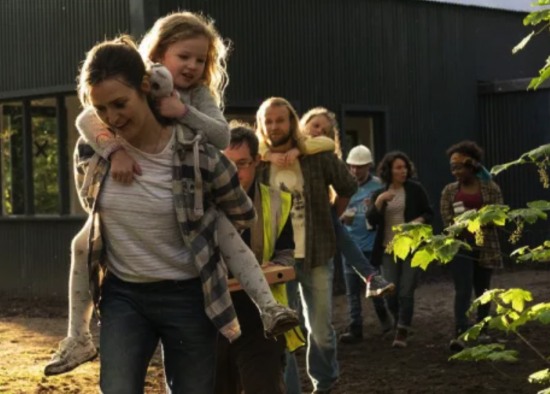LFF 2020 Review: Herself – “An enjoyable piece of modern cinema”
The first ten minutes of Phyllida Lloyd’s Herself lay out an unfortunately familiar story: Irish single mother Sandra (Clare Dunne, also co-screenwriter and story creator) lives with her two young girls in a cramped hotel on the financial bleeding edge, having left her abusive husband. She works three jobs, suffocating beneath the weight of an appalling and Kafkaesque welfare system. Then Sandra has a mathematical revelation, enabling Lloyd and Dunne to turn this kitchen-sink drama into something fresher and more cogent. Herself is an uplifting testament to personal triumph.
To say more about the plot would give away some of the film’s secrets, but it’s safe to say that Herself dares to suggest that comprehension of basic economics is not limited to those with a tertiary education or a Wall Street address. The film also takes care to never shy away from one of its central themes: that poverty is not a choice, those living under such conditions cannot achieve anything without the help of the proverbial village.
Herself charts Sandra’s journey as an abuse survivor and as the beneficiary of a great deal of luck, while emphasising that without her tenacity the story might have a different ending. Herself is also ripe with character interactions, Sandra exploring a sweet relationship with Peggy, an older doctor she acts as carer for (played without vanity by the excellent Harriet Walter) and a platonic, healthy friendship with reluctant builder Aido (Conleth Hill – so pleasing to watch). The script also enables Lloyd to tell two intersecting stories: Sandra’s positive steps to escape from the terrifying Gary (Ian lloyd Harrison) are constantly tempered by a PTSD-whodunnit showing the extent of Gary’s abuse and how it impacted Sandra’s family, including a notable court scene showing the manipulation of the welfare system against women. However, apart from some inspiring yet intrusive musical choices, Lloyd never allows Sandra’s story to become too maudlin nor too sunny.
Dunne is completely immersed within the role in a way that writer-actors are allowed to be, and she carries the heart of the movie. Lloyd employs luminous close-ups, with Dunne’s own under-eye birthmark used to represent Sandra’s inner trauma and exhaustion. There is a lovely, natural relationship between Dunne and her onscreen daughters (played by Molly McCann and Ruby Rose O’Hara) which makes the familial abuse all the more painful.
Lloyd progresses the story with a sense of urgency enabling viewers to experience Sandra’s desperation, as she tries to outrun her fears before actions catch up with her. And Herself should be praised for both casting a Down’s Syndrome actor in a role that never focuses on his condition, and for highlighting the role in Sandra’s achievements played by others considered on the fringes of society. How uncomfortably familiar it is to see that the people most willing to help are those with the least to give.
Herself is an enjoyable piece of modern cinema working towards a goal to last beyond its 90 minutes. Along with Tom Harper’s Wild Rose, Herself expands on the tradition of using poverty and pain as a catalyst for female perseverance, by demanding that we ask better questions of the society that allows these women to suffer.










